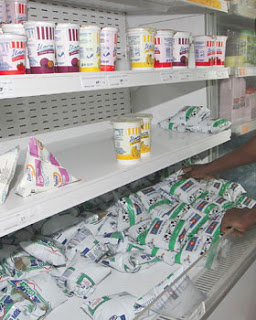KENYA: Bishops Challenge the Taxing of Basic Commodities

The government of Kenya
has defied the call of Kenyan Catholic Bishops, which urged them not to tax
basic goods. Starting 2nd September 2013, basic consumer goods such
as milk and electricity among other things which were previously zero-rated
will now attract 16% Value Added Tax (VAT).
has defied the call of Kenyan Catholic Bishops, which urged them not to tax
basic goods. Starting 2nd September 2013, basic consumer goods such
as milk and electricity among other things which were previously zero-rated
will now attract 16% Value Added Tax (VAT).
 This came in the wake
This came in the wakeof the Kenyan president Uhuru Kenyatta signing into law the bill, which imposes
VAT on basic commodities such as milk, fertilizer, cooking gas, text books and
cost of electricity among other retail products.
The Bill was signed
into law by the president mid-August and on 2nd September; the Kenya
Revenue Authority published a notice declaring its intent to fully implement
the law.
into law by the president mid-August and on 2nd September; the Kenya
Revenue Authority published a notice declaring its intent to fully implement
the law.
The Catholic Church
through the Chairman of Kenya Catholic Bishops Conference His Eminence John
Cardinal Njue on 28th June, 2013, during a press conference expressed
that it was against the idea of imposing taxes on basic commodities as doing so
would burden Kenyans further.
through the Chairman of Kenya Catholic Bishops Conference His Eminence John
Cardinal Njue on 28th June, 2013, during a press conference expressed
that it was against the idea of imposing taxes on basic commodities as doing so
would burden Kenyans further.
In a statement red to
the press, the Cardinal said that “We are deeply concerned by the
government’s attempts to increase the taxes and therefore the prices of basic
commodities and services. We remind the government that despite the increase in
Kenya’s budget and government income, majority of Kenyans are poor, jobless and
lack a stable source of income.”
the press, the Cardinal said that “We are deeply concerned by the
government’s attempts to increase the taxes and therefore the prices of basic
commodities and services. We remind the government that despite the increase in
Kenya’s budget and government income, majority of Kenyans are poor, jobless and
lack a stable source of income.”
 The Catholic Church was
The Catholic Church wasreacting to the VAT bill 2013, which the government had prepared as it planned
to impose value added tax on goods previously zero-rated. They include bread,
milk, maize flour, sanitary pads and newspapers.
Previously electricity
was subject to a 12 per cent VAT while households that consumed less than 200
units per month were VAT exempt. Under the new law, all consumers will pay 16
per cent regardless of the number of units.
was subject to a 12 per cent VAT while households that consumed less than 200
units per month were VAT exempt. Under the new law, all consumers will pay 16
per cent regardless of the number of units.
Initially Treasury had
hoped to raise Sh10 billion through the revision of the VAT Act. Though the initial list of goods that would
be subject to VAT included maize and wheat flour, sanitary pads and processed
rice, some of these items were deemed too essential and struck off the list.
hoped to raise Sh10 billion through the revision of the VAT Act. Though the initial list of goods that would
be subject to VAT included maize and wheat flour, sanitary pads and processed
rice, some of these items were deemed too essential and struck off the list.
Source:
AMECEA Social Communications
AMECEA Social Communications


